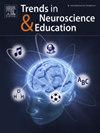What do Chinese psychology majors know about brain research?
IF 3.4
Q2 NEUROSCIENCES
引用次数: 0
Abstract
Background
China has recently emerged as a neuroscience leader. Given the absence of undergraduate neuroscience programs at most Chinese universities, future neuroscientists are likely to be recruited from psychology departments. Consequently, the question of whether these students possess neuroliteracy, an understanding about the brain and its functions, that may support their future training is an interesting topic for investigation.
Methods
We administered a neuroliteracy survey to a sample of undergraduate psychology majors enrolled in Chinese public universities (n = 546).
Results
Students were more accurate when identifying true statements, especially those related to plasticity, but performed worse when evaluating the authenticity of false statements. News reading was associated with higher overall neuroliteracy, and higher accuracy on false statements.
Conclusions
This is the first investigation of neuroliteracy conducted in a student sample in China, with implications for the design of undergraduate psychology programs to support the development of this competency.
中国心理学专业的学生对大脑研究了解多少?
中国最近已经成为神经科学领域的领导者。鉴于大多数中国大学缺乏神经科学本科专业,未来的神经科学家可能会从心理学系招聘。因此,这些学生是否具备神经素养,即对大脑及其功能的理解,这可能支持他们未来的培训,这是一个有趣的调查话题。方法对546名公立大学心理学专业本科生进行神经素养调查。结果学生在识别真实陈述,尤其是与可塑性相关的陈述时准确率更高,但在评估虚假陈述的真实性时表现较差。新闻阅读与更高的整体神经素养和更高的虚假陈述准确性有关。这是第一次在中国学生样本中进行的神经素养调查,对设计本科心理学课程以支持这种能力的发展具有启示意义。
本文章由计算机程序翻译,如有差异,请以英文原文为准。
求助全文
约1分钟内获得全文
求助全文
来源期刊

Trends in Neuroscience and Education
NEUROSCIENCES-
CiteScore
6.30
自引率
6.10%
发文量
22
审稿时长
65 days
 求助内容:
求助内容: 应助结果提醒方式:
应助结果提醒方式:


